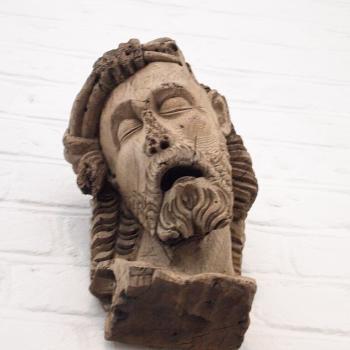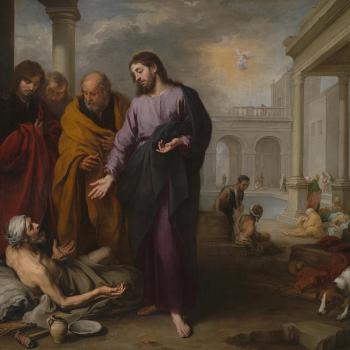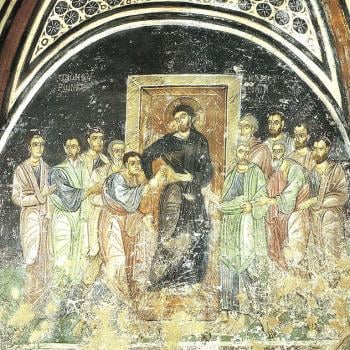
I have long held a strong affection for the story of the Magi, the story of the Wise Men from the East (Zoroastrians), who, thanks to their astrological studies, learned of the birth of Jesus and made a long journey to Bethlehem. They believed there was something special about him and his birth, and so they wanted to render him the honor they believed he was due. Tradition says that they became devoted followers of Christ, adoring him throughout their lives. Why do I like their story so much? There are many reasons, but one which calls me the most is that it reveals the inclusive nature of God’s work with the world. The Magi learned of the birth of Christ, and of his importance, through their own cultural and religious tradition, showing us that God had given them, and their nation, elements of the truth which pointed to and prepared them for the incarnation. It was not just the Magi. They only serve as an example of the greater truth, that Jesus is the expectation of the nations, and as such, God was at work with all nations, not just the people of Israel. This is why Christians should not entirely dismiss non-Christian faiths and traditions, because in them, if Christians are discerning, they can find all kinds of wisdom and knowledge which Christians not only can acknowledge as being true, but as being useful for Christians to know and incorporate it in their own understanding of God. After all, if God revealed something to other nations, then , because it came from God, it should be viewed as important and not insignificant. We must not think that Christians have an exclusive hold on to the truth, even in religious matters; what they have with Christ is the cornerstone who can and will connect everything together. Rays of truth can be and are found throughout the world, and should be respected, be it from non-Christian religious traditions (such as the Zoroastrian tradition that the Magi came from), or from science (as truth does not contradict truth). It is for this reason Marsilio Ficino would, therefore, use the example of the Magi to defend his bold philosophical enterprise, an enterprise which, though changed in content because we have better knowledge and understanding of the history and teaching of world religions than Ficino had, I still hold to in my own work of comparative theology.
It is perhaps, for a similar reason, that my favorite modern-day Christmas song is that of the Little Drummer Boy (originally entitled Carol of the Drum). In it, a young poor boy is encouraged by the Magi to join them in their pursuit of the newborn king, to honor the king with them. The boy, thinking he has nothing to give to Christ, decides to give what he can, a gift of himself and his talents by playing the drum for the babe. While the song is fictional, it represents many theological truths, making it fitting for the Christmas season (and beyond). For example, we see in it a representation of the preferential option for the poor: the boy finds that the king he came to honor was, in many respects, a poor boy like him, and through it, we can discern the way God’s solidarity is with the poor, coming into the world to be one with the poor instead of the rich elite. The boy, likewise, can be seen as representing all those who are poor and destitute, those who look down upon themselves and feel they have nothing of value in and of themselves, that their love, and what they do out of love, is a greater gift to God what some rich man or woman gives out of a sense of obligation. This is an important aspect of the song, and because of it, many who are poor, men and women alike, can and should see themselves in the drummer boy, and that means, they can and should feel free to adapt the song itself to express that connection (as, for example, women should feel free to turn the boy into a girl).
However, related to this, I see something else going on with the Little Drummer Boy, an element which was not likely thought of by Katherine Kennicott Davis, its original author, but yet an element which can and will come out of it by those who have an appreciation of world religions (and cultures). The boy continues to represent what the Magi represented, that is, the way God accepts and brings to fruition the religious heritages of the world. This is because, around the world, the drum is often seen as a sacred instrument, one which is used in various important religious functions. For example, in India, the drum is a special kind of instrument, one needed to be included in many religious rites, and yet, despite its holy function, seen to be made of impure (or defiling) elements, so that it is proper for the Dalits (that is, the outcastes or untouchables), to be the ones who are called to use the drum in various rituals. Indeed, it is one of the few times the Dalits are welcome, and even wanted, by non-Dalits, and so they are often hired so as to make sure no one else has to touch impure objects which would defile the one who touched them. The Dalits already are seen as impure, so they would not be adversely affected (though, if one reads what the Dalits have to say about this, it is clear, they do not agree, and indeed, embrace as a good what others see as impure, leading them to suggest it is others, not themselves, who are defiled). There is something Christ-like in their existence, for Christ came into the world, lived with and became one of the outcasts of society, until at last, he was put death on “the tree” in order to save the world by taking on the defilement of all the sins of the world upon himself.
Thus, if we see in the little drummer boy another example of a Magi, as someone with his own religious heritage (connected with the drum), connecting him to all who use the drum as sacred, we can see an interesting religious truth revealed in and through the song: the drummer boy (and all those who drum with him being viewed as lowly or even outcaste) come to Christ both to honor and love Christ, but also to have themselves, and the good in them, approved by Christ, so that they are lifted up and made great by him. They find their life is important, that Christ not only has accepts them, but their status, the way they are viewed harshly by society, connects them to Christ, and in and through that connection, allows them to be made great in the kingdom of God. They should see that they have been given by Christ a special mission, one which takes into accord who they are: they are now fit to announce the way of Christ in and through their drum, and in doing so, find that Christ has even affirmed the sacred nature of the drum.
Thus, just as we can learn from the Magi that we should explore the truths found in other religious faiths, not only discerning how they point to and prepare for Christ, but also how they possess truths which Christians should recognize, so we can learn from the rituals of the world, and the people who engaged them, finding this represented to us by the little drummer boy who found his personal value affirmed both by Mary and Jesus. We should especially look to those, like the Dalits, who have been constantly used and denigrated by the rest of society and affirm them in the way Christ has affirmed the drummer boy, recognizing that their lives connect them in a special way with Christ, and in that connection, they have a great place reserved for them in the kingdom of God.
* This Is Part XXXIV Of My Personal Reflections And Speculations Series
Stay in touch! Like A Little Bit of Nothing on Facebook.
If you liked what you read, please consider sharing it with your friends and family!
N.B.: While I read comments to moderate them, I rarely respond to them. If I don’t respond to your comment directly, don’t assume I am unthankful for it. I appreciate it. But I want readers to feel free to ask questions, and hopefully, dialogue with each other. I have shared what I wanted to say, though some responses will get a brief reply by me, or, if I find it interesting and something I can engage fully, as the foundation for another post. I have had many posts inspired or improved upon thanks to my readers.












